U.S. Department of Transportation
Federal Highway Administration
1200 New Jersey Avenue, SE
Washington, DC 20590
202-366-4000
Federal Highway Administration Research and Technology
Coordinating, Developing, and Delivering Highway Transportation Innovations
| REPORT |
| This report is an archived publication and may contain dated technical, contact, and link information |
|
| Publication Number: FHWA-HRT-15-008 Date: July 2016 |
Publication Number: FHWA-HRT-15-008 Date: July 2016 |
Note, where multiple surveys were received from a single State transportation department, a composite answer was generated to reflect the collective response of that State transportation department. Also note that in the Comments sections, the parenthetical abbreviation that begins each comment is the State of the respondent. The comments are verbatim.
How does your agency assure the LPA is complying with QA standards and specifications?
(out of 32 responses)
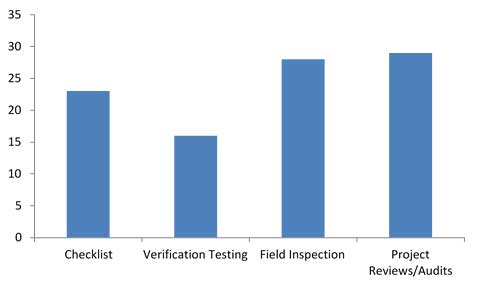
Figure 22. Bar Graph. Responses on how State transportation departments assure LPAs are complying with QA standards and specifications.
Comments:
(DE): We conduct the majority of the testing and oversight.
(IN): DOT requires that the LPA have a certified Employee in Responsible Charge, ERC, to be able to apply for or manage a project, also the LPA consultants must also have certifications to administer/manage the project.
(MN): We have staff specifically employed to help.
(NV): Review and approval of LPA’s QA procedures prior to NTP of contract.
(OK): The LPA projects are advertised, let and awarded by the DOT. Some contracts are administered directly by DOT, others are administered by consultants or a county circuit engineering district. In those cases the consultant/CED reports to a DOT district. Uses SiteManager to administer contract.
(OR): These pieces are in place when doing DOT administered projects but not for LPA administered projects.
(SD): The Transportation Enhancement Program is the only program where LPA’s administer the projects. All other federal aid projects are administered by the DOT. We recently changed our processes to not allow LPAs to administer any federal aid projects, due to certification issues.
(UT): On Federal-aid projects our LPAs use DOT’s design and construction processes.
(VT): Our Materials & Research Group prepares listing of certification and testing requirements on LPA projects per the Agency’s approved Quality Assurance Program. We withhold payment to LPAs until they have certified that they have been complied with on payment requests.
(WI): Uses a Management Consultant to oversee the Local Program. Construction consultants are selected to oversee individual projects. These consultants perform verification testing.
Has your agency trained its staff (or consultants) on how to oversee the construction QA on LPA projects?
(out of 31 responses)
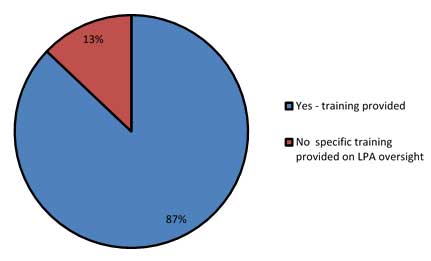
Figure 23. Pie Chart. Responses on whether transportation State departments have trained staff on how to oversee construction QA on LPA projects.
Comments:
(CT): Training on Municipal Manual Chapter 18, Testing Requirements.
(DE): No—state administers contract.
(KS): Yes—informal on-the-job training.
(MI): No formal training, most has been through meetings, conferences, and presentations.
(NV): No- Formal training has been more focused on LPA’s. We work with FHWA to provide training on administration of all federal-aid projects with our own staff.
(NY): Yes- some training has been provided since local projects operate differently than traditional Department projects.
(TX): No specific training on this topic.
Has your agency trained LPAs on how to implement the QA standards for a Federal-aid project?
(out of 31 responses)
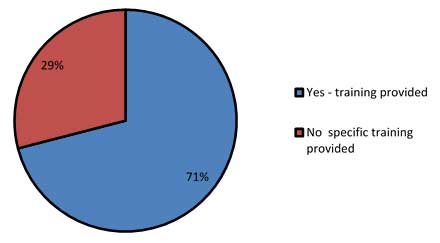
Figure 24. Pie Chart. Responses on whether State transportation departments have trained LPAs on how to implement QA standards for a Federal-aid project.
Comments:
(CT): Training on Municipal Manual Chapter 18, Testing Requirements.
(KS): We have 2-3 training sessions each year on specific areas.
(ME): Training is mainly in the pavement and concrete areas.
(NV): Most of the training is brief and high-level.
(NC): No formal training. Overview sessions and webinar training are conducted. Individual project training has also been conducted.
(OR): No specific training provided. LPAs try to follow the guidance of the state QA program, but it isn’t always a good fit for them.
Does your agency account for compliance with these QA standards and factor it in when estimating the overall cost of the LPA project?
(out of 29 responses)
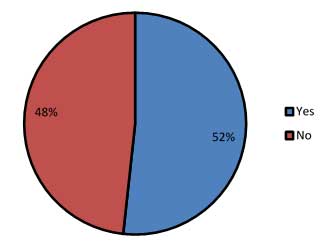
Figure 25. Pie Chart. Responses on whether State transportation departments account for the QA standards and factor them in when estimating overall cost of the LPA project.
Are the LPAs responsible for the additional funds to complete the necessary testing to comply with the QA standards?
(out of 30 responses)
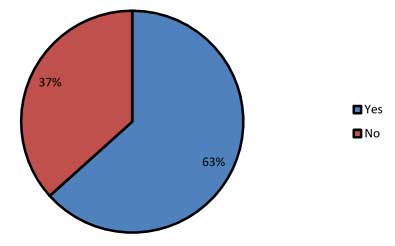
Figure 26. Pie Chart. Responses on whether LPAs are responsible for the additional funds to complete the necessary testing to comply with the QA standards.
Comments:
(CT): Included in the LPA agreement work scope.
(MI): The majority of the time the LPA will 100% fund the Construction Engineering (CE), Inspection & Testing (I&T) for the project. However there is a small amount of LPA projects in Michigan that utilize Federal Funds for the CE and I&T.
(NC): Yes. However, these can be reimbursed to the LPA if funding is available.
(OR): Funds would be programmed in as a project cost.
Which of the following procedures or activities does your agency maintain or conduct?
(out of 29 responses)
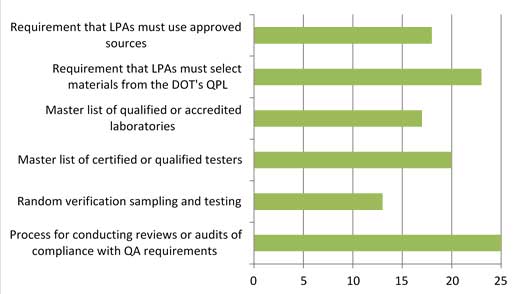
Figure 27. Bar Graph. Responses on which procedures or activities State transportation departments maintain or conduct.
Comments:
(CT): DOT provides schedule of minimum requirements for sampling materials for test.
(KS) For local roads (non-NHS) LPAs follow their specifications - for NHS they follow DOT specs.
(OR): Certified LPAs develop their own procedures that are reviewed and approved by the DOT. The procedures the DOT would undertake would vary depending on the LPA approved program specifics.
(UT): All materials must meet our current DOT specs for FAA projects.
(VT): While not making master lists of qualified testers or laboratories online, we do provide this information if LPA or its consultant has difficulty with this. Most of the consultants used by LPAs are very much in the loop on this.
(WS): We have a QPL but the agency/contractors are not required to utilize it for all products.
Does your agency allow LPAs to use their own specifications or standards for activities or items related to materials or construction QA?
(out of 32 responses)
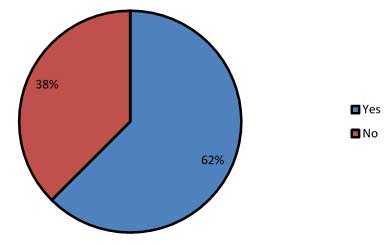
Figure 28. Pie Chart. Responses on whether State transportation departments allow LPAs to use their own specifications or standards for activities or items related to materials or construction QA.
Comments:
(IN): LPA-generated specs are given to the DOT for review and incorporated into the contract before letting if acceptable.
(IA): LPAs can write special provisions for items not covered by DOT Standard Specs
(KS): For local roads (non-NHS) LPAs follow their specifications - for NHS they follow DOT specs.
(MD): LPAs must get approval from State for any specs or standards not previously approved by state.
(MI): LPA specifications need to be approved by DOT.
(NE): LPA specifications are reviewed and approved by DOT.
(OR): In general, LPA uses DOT standards with some modifications through the project special provisions.
(UT): Yes—if the LPA standard is equal or better than UDOT’s Specifications.
(WI): LPA projects generally incorporate the state standard specifications into their projects with special provisions used to make specific changes.
Does your agency’s IA program cover the LPA’s testers and equipment?
(out of 31 responses)
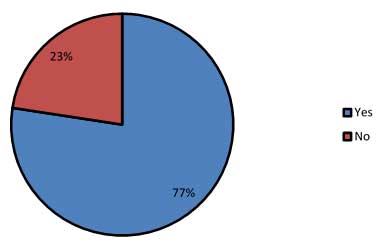
Figure 29. Pie Chart. Responses on whether the IA program of the State transportation departments covers the LPA’s testers and equipment.
Comments:
(MI): NHS routes only receive IA and must be certified for the testing they are performing.
(NV): No- They must obtain their own for the project that meets the requirements.
(NY): Yes- compliance is difficult since DOT is not informed of timing of specific work to perform ISAT.
(OR): Yes- If the certified LPA chooses to include this as part of the approved QA program.
Do the LPAs develop their own IA programs for use on Federal-aid projects?
(out of 33 responses)
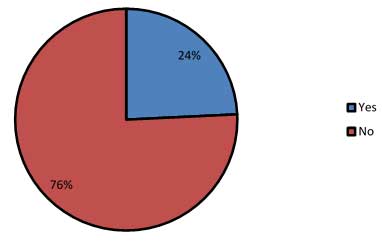
Figure 30. Pie Chart. Responses on whether the LPAs develop their own IA programs for use on Federal-aid projects.
Comments:
(NV): No—Not really. They are struggling with the requirement for IA, especially the smaller LPAs.
(OR): Yes—They can either develop their own, or use the standard DOT program.
(TX): Yes—Applies to only major projects.
On a typical federally funded LPA project, please characterize the nature of your level of effort for materials and construction inspection.
(out of 27 responses)
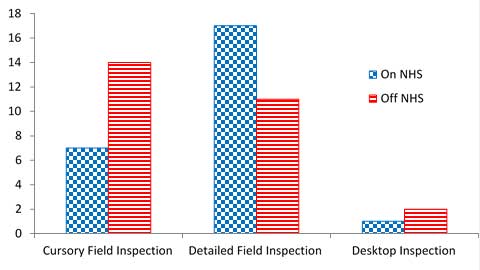
Figure 31. Bar Graph. Responses on the nature of the State transportation department level of effort for materials and construction inspection on projects on and off the NHS.
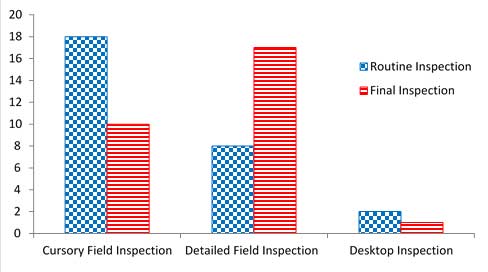
Figure 32. Bar Graph. Responses on the nature of State transportation department level of effort for materials and construction inspection (routine or final) on projects.
Comments:
(MI): Routine periodic inspection may also include a file review. All projects require a final inspection and file review before issuing final payment. Roadway classification does not matter, the use of Federal Aid is the criteria we use.
(MN): Very few projects on the NHS are handled by LPAs
(OR): Level of effort would depend on the specific LPA approved QA program.
What level of construction inspection (prior to final acceptance) do you apply for each of the following project types?
(out of 31 responses)
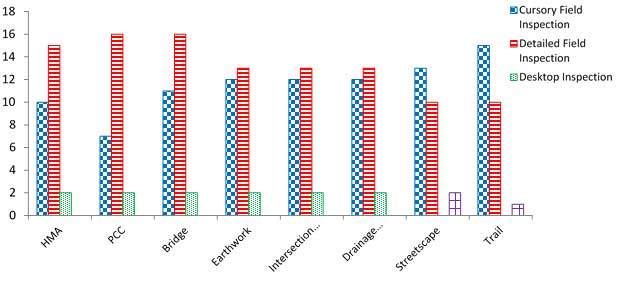
Figure 33. Bar Graph. Responses on the level of construction inspection (prior to final acceptance) that State transportation departments apply by project type.
Comments:
(MD): State inspects at critical points in project construction.
(MI): DOT performs a cursory field inspection and a review of project documentation prior to final acceptance. Detailed field inspection is the LPA’s responsibility.
(OR): Depends on the specific LPA approved program, but state would generally perform little to no onsite overview.
(UT): DOT requires that the CE work is done by Consultants who have passed materials and construction certification testing.
(WI): Department let projects are managed by consultants contracted with the department.
Estimate how frequently the following issues may have occurred on federally funded LPA projects.
(out of 28 responses)
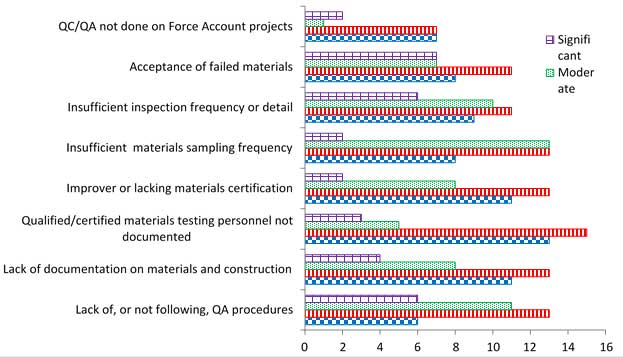
Figure 34. Bar Graph. Estimates of how frequently certain issues may have occurred on federally funded LPA projects.
Estimate the perceived impact of QA issues.
(Out of 36 individual responses—results include all responses received from individuals, i.e., results from multiple representatives of a State transportation department were not aggregated into a single adjusted response)
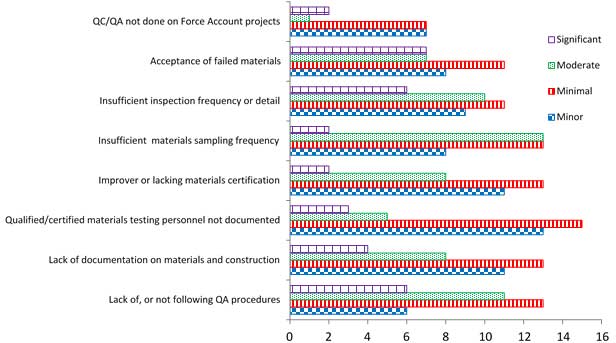
Figure 35. Bar Graph. Estimates of the perceived impact of QA issues.
Comments:
(NV): As our resident engineers conduct thorough field inspections before releasing an LPA Project, the impact is time and money. They don’t release a project until errors are corrected.
Best Practices to Mitigate Challenges with QA on LPA projects.
(AZ): All LPA projects with the exception of LPA’s that have been approved as Certification Acceptance are administered by DOT. LPA projects administered by DOT have virtually no instances of non-compliance.
(CT): District MSAT members provide continuous education to LPAs.
(GA): Certification and training.
(IN): Treating LPA projects with the same level of effort as any DOT project.
(IA): Very knowledgeable and experienced DOT district construction and materials staff who know the LPAs they work with - which ones need more or less help.
(ME): Training of LPAs on QA requirements; attendance by DOT at precon/prepaving meetings; communication between IA staff and LPA consultants; DOT performing HMA lab testing for LPAs; HQ staff assigned for LPA oversight.
(MD): Meet with locals on a regular basis to make sure they understand the program processes and to address changes from FHWA on program oversight. We are in process of developing a guide for locals.
(MI): New QC/QA specifications for concrete for LPA projects that is similar to DOT’s trunkline specifications concrete QC/QA.
(MN): We hired a staff specifically to help train and advise in the field, required certified personnel, only pass funds through state aid eligible cities and counties which ensures they have appropriate staff.
(NE): Checklists.
(NV): We require the LPA to follow our QA procedures or have their procedures approved by our construction office. Additionally, our resident engineers oversee the LPA projects much like they do a regular DOT project, with the LPA completing the work and the DOT resident engineer signing off on the work. The LPAs are vetted by our Central office for each project. They each are given the expectations/requirements for the projects.
(NC): Face to face meetings between DOT and LPA staff to discuss best practices.
(OH): Reports on LPA construction monitor field activities on a monthly basis.
(OR): For non-certified LPA, we perform a complete review of all QA and payment documentation. This allows any missed steps to be identified and rectified prior to final contract payment.
(UT): We have the same group in Materials & Research prepare the testing and certification requirements per our approved QAP just as they would on an Agency-bid project.
(WS): After issues have been identified via the yearly program management reviews we develop training and best practices that are sent out to all LPA agencies.
(WI): Construction consultants are used by the department to oversee LPA construction projects. These consultants perform verification testing.
Does your agency prepare the materials sampling and testing schedule for a LPA-administered Federal-aid project?
(out of 26 responses)
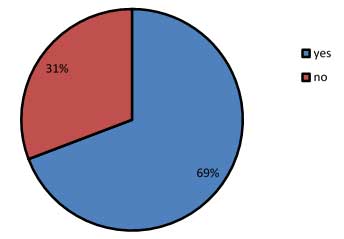
Figure 36. Pie Chart. Response to whether State transportation departments prepare the materials sampling and testing schedule for a LPA-administered Federal-aid project.
Comments:
(AZ): No—DOT reviews the LPA’s sampling and testing schedule for LPA administered projects.
(IA): Yes—Specified in DOT Specifications and Materials Instructional Manuals.
(ME): We provide a set of minimum testing requirements, which indicates testing frequencies.
(MI): Yes—These are established for all Federal Aid project through the DOT Materials Source Guide and Minimum Documentation Guide in addition to the plans, proposal, and specifications.
(MS): No—The LPA is responsible for generating a Sampling and Testing Proposal which is submitted to the agency for approval.
(NV): No—each LPA is required to submit their own schedule, which is required to meet FHWA/NDOT minimum frequencies.
(NY): Yes—standard DOT practices and frequencies are supposed to be adhered to.
(OR): Yes—For non-certified agencies. Certified LPAs can develop their own schedule and have it approved by DOT. If the project is DOT administered they follow DOT sampling and testing schedules.
(UT): It is a standard spec and is in our Minimum Sampling and Testing guidelines.
(WS): Yes—Some agencies with more lab personnel develop their own.